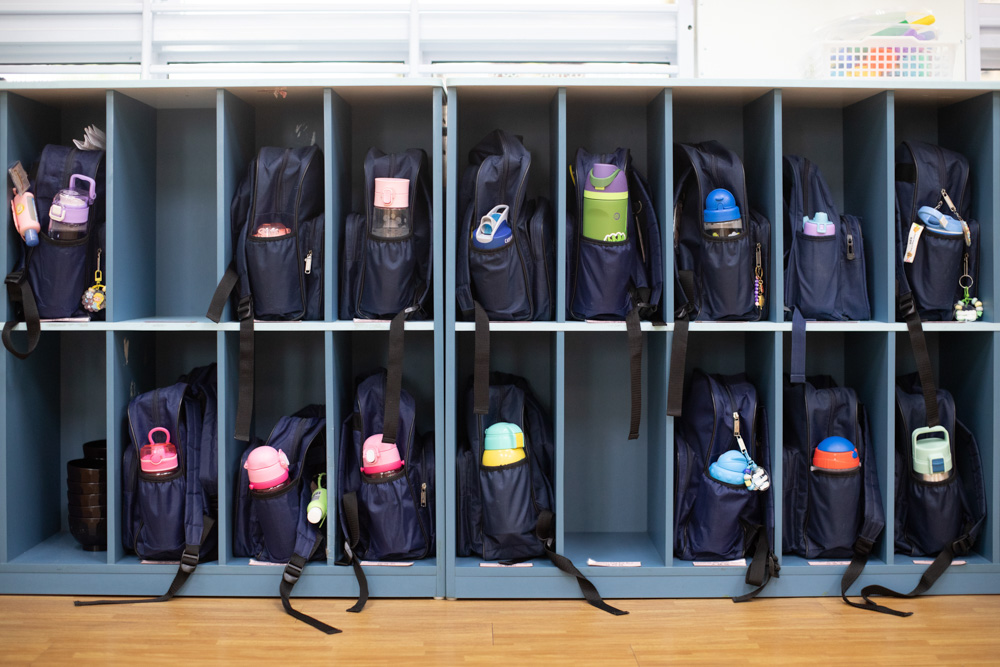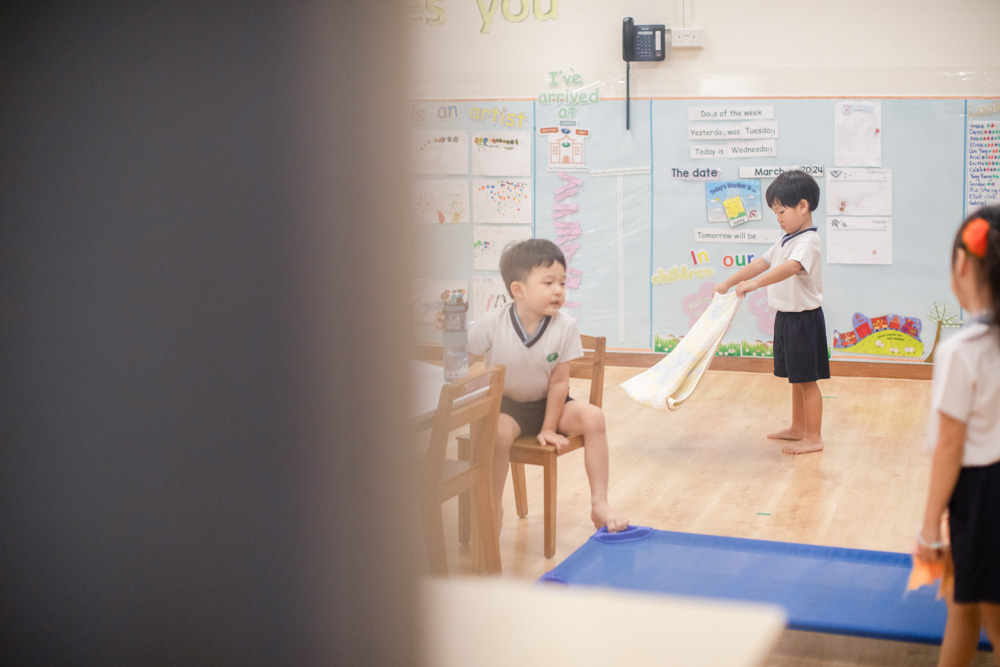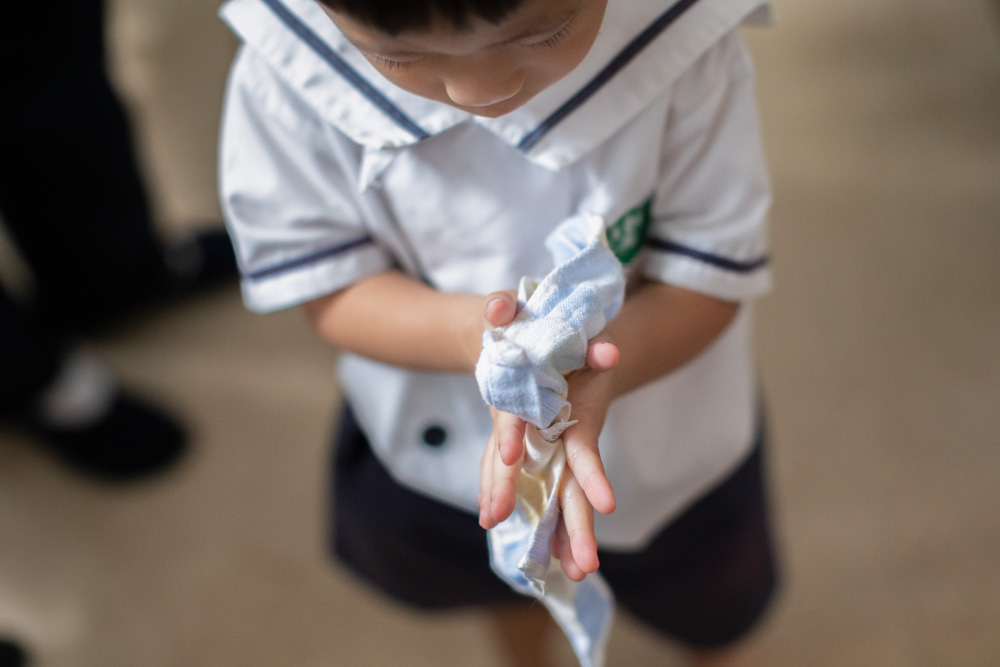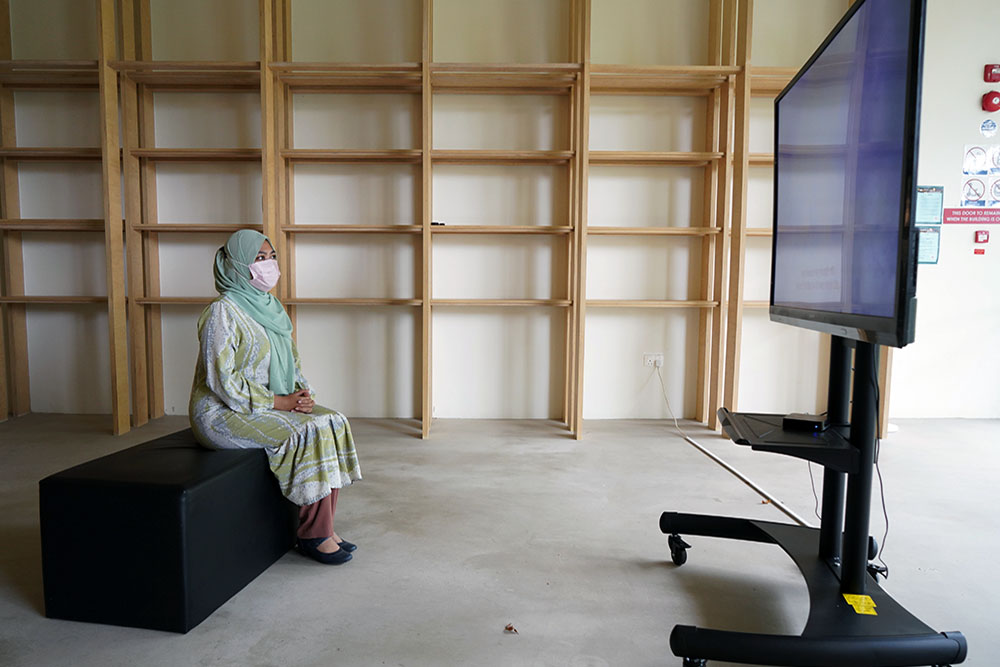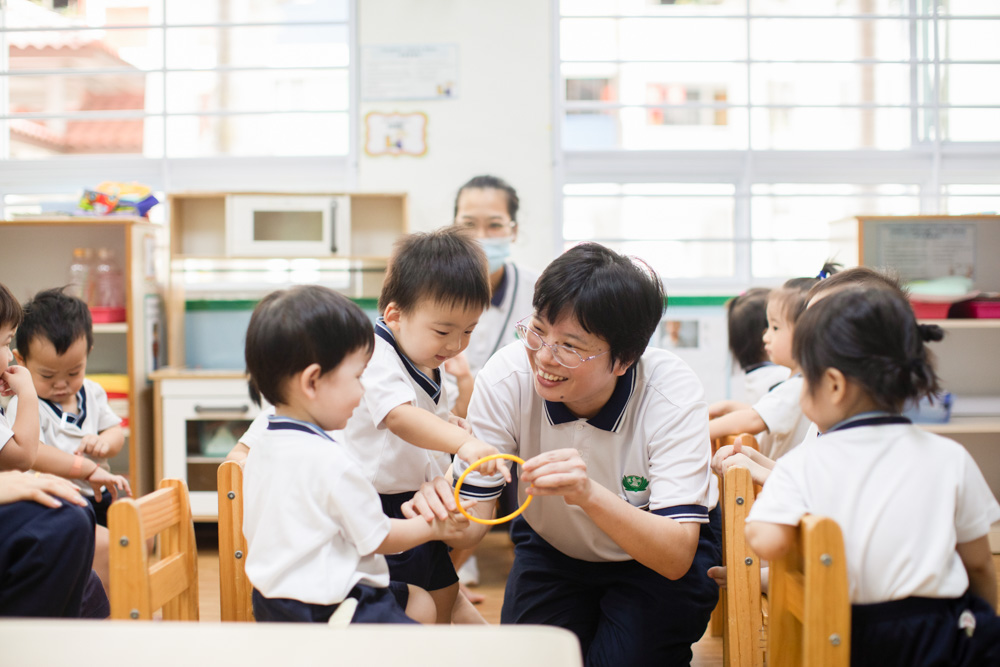 (Photo by Donn Tan)
(Photo by Donn Tan)
“You can't use your hands, and don't paint outside the paper.”
On this day at Tzu Chi Great Love Preschool, the teacher presented a unique challenge: the children have to paint using their feet instead of their hands to experience the difficulties of the physically challenged.
Sitting on the floor in pairs, one child held the paper steady while the other tucked their hands into their clothes, gripped a brush with their feet, and enthusiastically splashed watercolours onto the paper. As the brush danced across the paper, the children's faces flushed as they struggled to colour the paper while keeping the paint from “going out of bounds.” The sight of their colourful and chaotic creations brought fits of giggles, filling the classroom with joy.
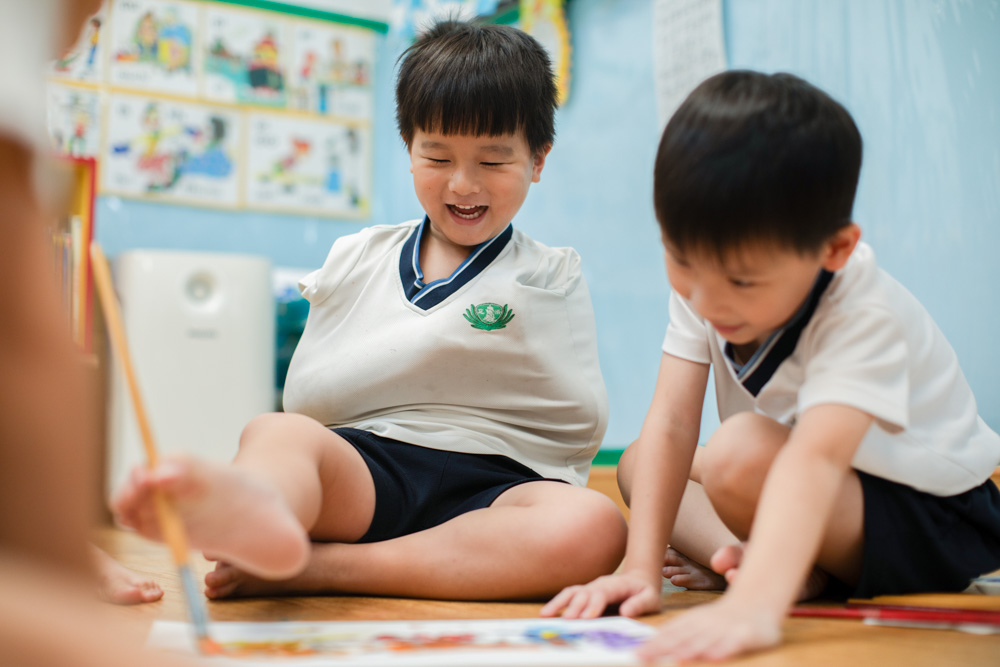 (Photo by Donn Tan)
(Photo by Donn Tan)
Experiencing is the start of learning
In another activity, the teacher spread several sheets of A4 paper on the floor and asked the children to stand on them, simulating the experience of a confined animal unable to move freely. At the teacher’s command, sheets of paper were gradually removed, forcing the children to squeeze onto the remaining spaces.
“Let me in!”
“Teacher, hurry up, I'm going to “fly” off!”
Along with the shrinking space, the children tried to squeeze into each other's “territory”, struggling to move in the crowded space. Some hugged each other tightly for balance, while others lifted their feet to avoid stepping out of the paper. The classroom echoed with excited squeals and laughter.
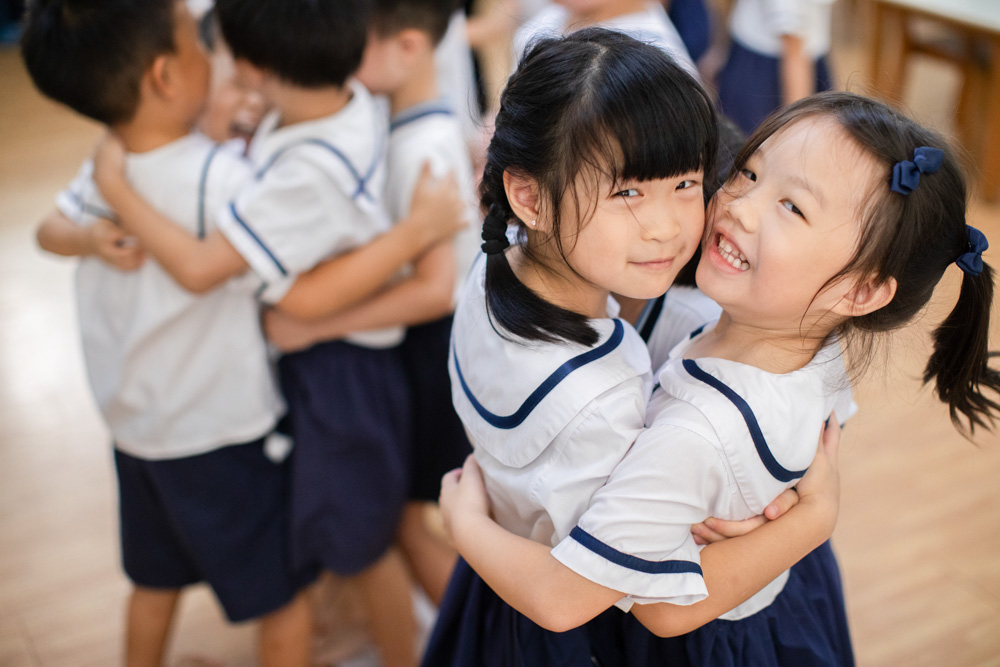 (Photo by Donn Tan)
(Photo by Donn Tan)
“We should give love and respect to all life.”
After the game, Teacher Huang Chia Lin (in the photo below) led the students in reciting the Jing Si Aphorism written on the whiteboard. After reading out loud, the children eagerly raised their hands to share their thoughts. "When the paper was taken away, it became so crowded that I couldn't move." "He wouldn’t let me in, and I fell off."
Encouraged by the teacher’s compliments and supportive words, the children were eager to express themselves verbally. Teacher Huang seized the opportunity to give them a deeper lesson: “Why didn’t you let your classmate in just now? Was it because it was too crowded?”
She went on to explain, “The battery cages that hens live in are about as small as this A4 sheet of paper, with two to four chickens crammed together. They eat, sleep, urinate, and defecate in the same tiny space. It’s so cramped that they often step on each other, just like you all did earlier.”
A little girl asked curiously, “When can they come out?”
Teacher Huang replied gently, “Some chickens stay in the cage for their entire lives, while others only leave when they become food.” Noticing the children’s expressions of partial understanding, she elaborated, “Animals have moms and dads too, and their parents would feel sad if they were confined like that. So, should we force others to do things we wouldn’t want to do? That’s why we should love animals and respect all forms of life.”
By creating a hands-on simulation that mirrored a real-life situation, the teacher helped transform a seemingly abstract Jing Si Aphorism into a meaningful lesson that resonated with the children. This learning-through-experience approach typically lasts for a week before moving on to the next Jing Si Aphorism theme.
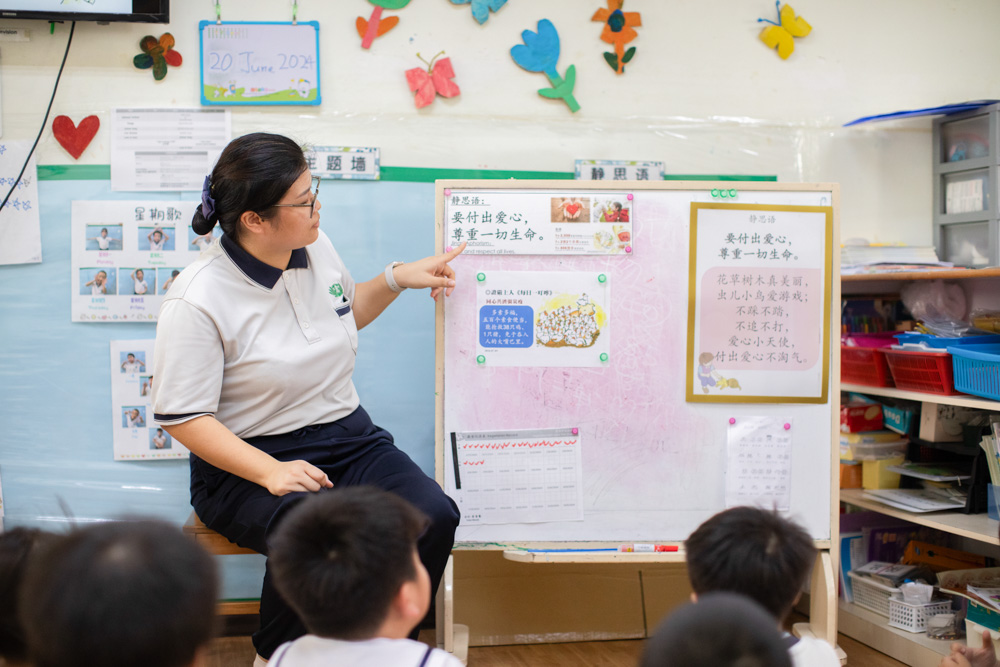 (Photo by Donn Tan)
(Photo by Donn Tan)
Nurturing a life of awareness
After ten years of operating in Singapore, teaching Jing Si Aphorisms has become a hallmark of Tzu Chi Great Love Preschool. The educators pondered how to instil character education in these young learners and nurture empathy in them. The key lies in “feeling”—connecting lessons to children’s life experiences. Whether through games that mimic physical disabilities or activities that simulate an animal’s living condition, the goal is for the children to understand what it means to be “different” or “a minority.” This approach encourages them to step into others' shoes and feel the feelings of others.
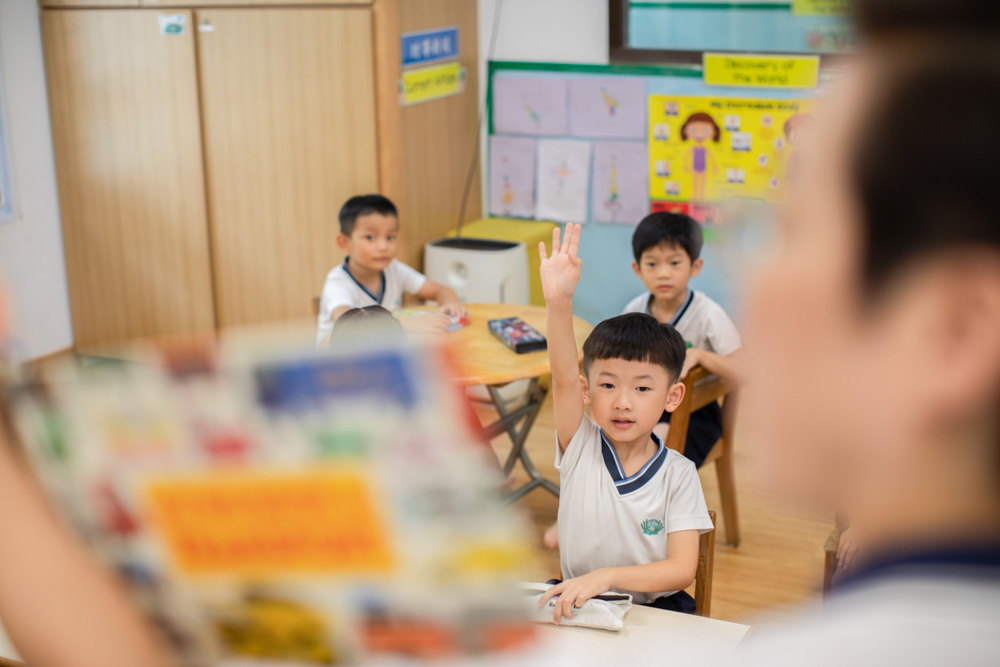 (Photo by Donn Tan)
(Photo by Donn Tan)
Like other preschools in Singapore, children at Tzu Chi Great Love Preschool are required to remove their shoes upon entering their classrooms. Each pair of white shoes is neatly placed in a small compartment of the classroom shoe rack, labelled with the child's name. Nearby, uniform school bags in matching colours and styles are stored in tidy lockers, contributing to a well-organised environment.
Besides maintaining cleanliness and order, the preschool places a strong emphasis on etiquette education. Whenever one passes by a classroom, the children will bow solemnly with their palms together and warmly greet the person, “Good morning, Auntie and Uncle!” Their tender yet earnest greetings create a welcoming atmosphere for all visitors.
The emphasis on being organised extends beyond public spaces to the children's personal belongings and clothing. Depending on their age, students are trained to perform various daily tasks independently. They are taught to eat on their own without wasting food, wash their dishes after meals, carry their own mattress for naps, take turns to clean table surfaces, and fold their own clothes.
This rigorous living skills training instils a sense of responsibility in the children, encouraging them to value the maintenance of their environment and develop lifelong habits of personal care from an early age.
Transforming knowledge into good character and mannerism
Young teacher Christine Yeo has been working in preschool education for nearly seven years, six of which have been spent at Tzu Chi Great Love Preschool. She strongly identifies with the preschool's emphasis on environmental protection and self-care as a key part of its educational philosophy.
For instance, the school encourages children to use handkerchiefs instead of paper towels after washing their hands to minimise unnecessary waste. “If each child uses one paper towel every time they wash their hands, a whole bucket of garbage can be filled in just half a day,” Christine explained with a smile. “Here, we can save a lot of paper towels in one day, which is equivalent to saving many trees.”
The school also upholds the practice of zero food waste, where teachers patiently guide children to develop the good habit of cherishing food and avoiding food waste. Even when some children are picky eaters, the teachers employ various strategies to encourage them to finish their meals. Not only do the children leave no leftovers in their bowls, but they also request for some water to rinse their bowls and drink the water.
Christine noted that this sense of responsibility for environmental protection is something she has not seen elsewhere. From the meticulous self-care routine in daily life to the practice of recycling and sorting during Environmental Sustainability Day, Christine recognises that environmental education is multi-faceted and can have a profound impact on a child's growth.
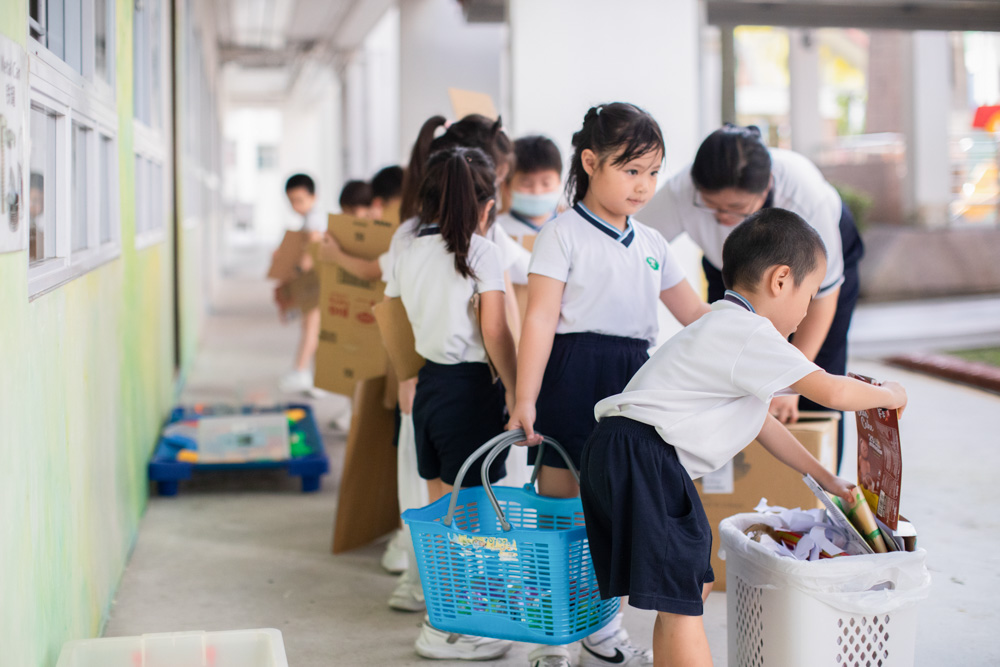 (Photo by Donn Tan)
(Photo by Donn Tan)
At the 10th Anniversary Celebration event of Tzu Chi Great Love Preschool in August, 11-year-old graduate Zoey Tang (pictured below on the right) returned to her alma mater to perform drumming with fellow alumni. The group met almost every week to practice for the celebration and also relive the old times.
When asked about the difference between attending preschool and primary school, the shy Zoey recalled and shared that when her primary school teacher spoke about environmental protection, animal care, and the importance of safeguarding Singapore's marine environment as the country is surrounded by sea, she had already learned these back in preschool.
She said proudly, “My friends would say ‘what a great preschool you went to, I didn't even learn all that in preschool’.”
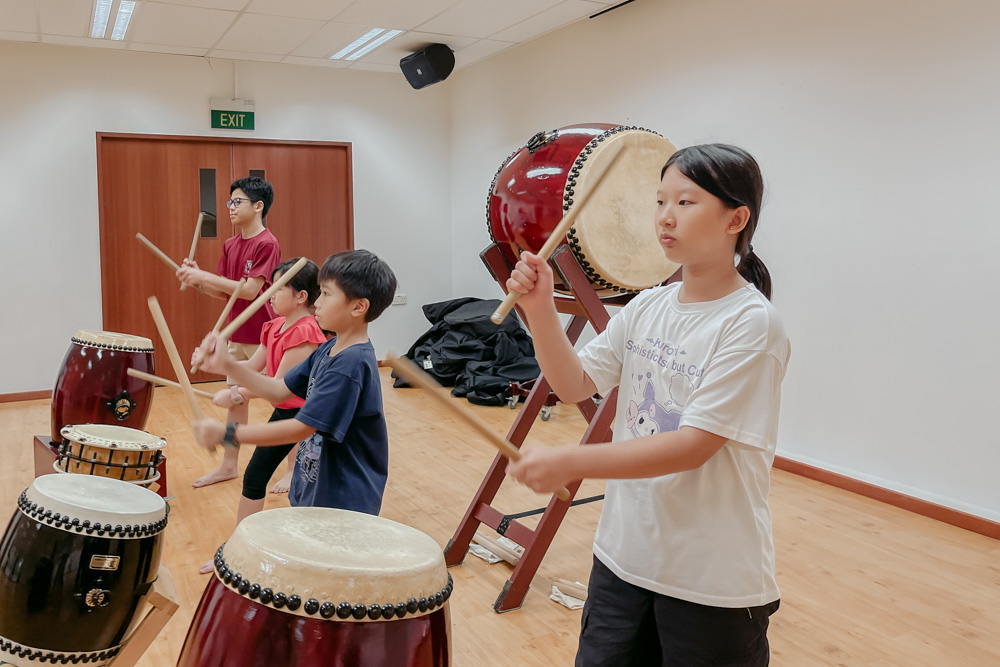 (Photo by Holly Foong)
(Photo by Holly Foong)
It’s faster to go slowly
The preschool education industry faces many challenges. Ms May Tai Nyeok Moi, Head of the Education Development Department, stated that teachers not only impart knowledge but also often encounter students with learning difficulties and those who require guidance in emotional management. In such an environment, it is not easy for the children to learn character education, environmental education, and self-care skills. The teachers need to show more love and patience to support them as they grow, which is also a significant challenge.
Adults are often eager to see quick learning results and transformations in their children. Sometimes, not only parents but also some teachers are so anxious for fast progress that they unknowingly help children complete tasks, depriving them of the opportunity to do things on their own. At Great Love Preschool, teachers devote considerable time to allowing and encouraging children to put on their shoes, finish their meals, and engage in hands-on resource sorting, even if it causes delays in subsequent classes, all of which contribute to the intangible costs of education. In the fast-paced and competitive world of Singapore, 'slow' has become a luxury. However, time is essential for children to master various skills.
May Tai opined that the key to solving this problem lies in gradually changing the perceptions of both parents and teachers simultaneously. This shift will eventually influence the children’s behaviour and the atmosphere in the classroom.
To help children cope with the fast-paced life, she shared that the preschool regularly organises flower arrangement and tea art sessions. Watching a tea leaf unfurl in water and matching the shapes and colours of different flowers and leaves not only exposes children to aesthetic education at an early age but also allows them to experience inner peace and concentration in this fast-paced, technology-driven era. Although children may not be able to express themselves clearly in words, she believes they can feel the peaceful and warm atmosphere.
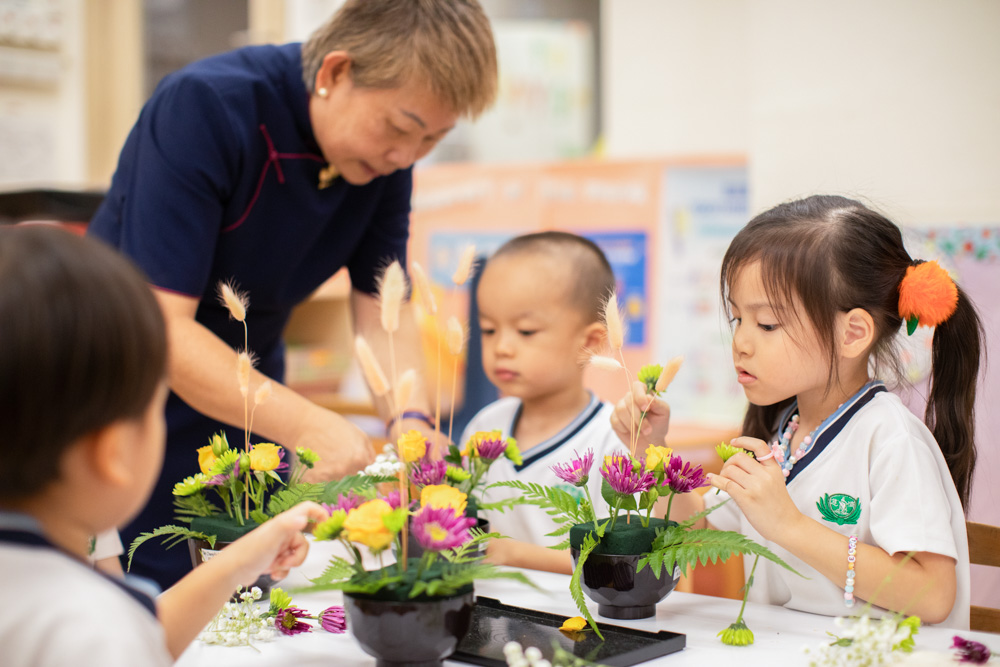 (Photo by Donn Tan)
(Photo by Donn Tan)
In this era of global digitalization, Singapore has been actively promoting the digitalization of the nation to prepare its people for the future. As a result, some preschools have started focusing on equipping young children with technological skills. However, May Tai stated that Tzu Chi Great Love Preschool continues to emphasise character building, recognising its vital role in children's development.
Early childhood is a crucial stage for character development, as it is when children form values and behavioural habits. Through character education, they can cultivate essential qualities such as integrity, honesty, and respect for others from a young age, laying a strong foundation for their future. Moreover, character education supports the holistic development of a child's body and mind, providing emotional and spiritual guidance that helps them balance academic, emotional, and spiritual growth, ultimately becoming well-rounded individuals.
“Children in Singapore are very blessed and have a lot of exposure to new technology at home. As long as the children possess good character and know how to discern between right and wrong, there is no need to worry about academics at all,” May Tai pointed out. “We also want our children to excel from the starting line, and that is to possess a good character.”
Upon closer examination, it seems that the continued use of Jing Si Aphorisms as teaching material in Great Love Preschools is closely related to today’s social, school, and family environments. 21st century children face a different set of challenges, including global social issues such as technological transformation, environmental sustainability, and wars. It is not just the transmission of knowledge that is needed to shape a child’s future way of learning and living.
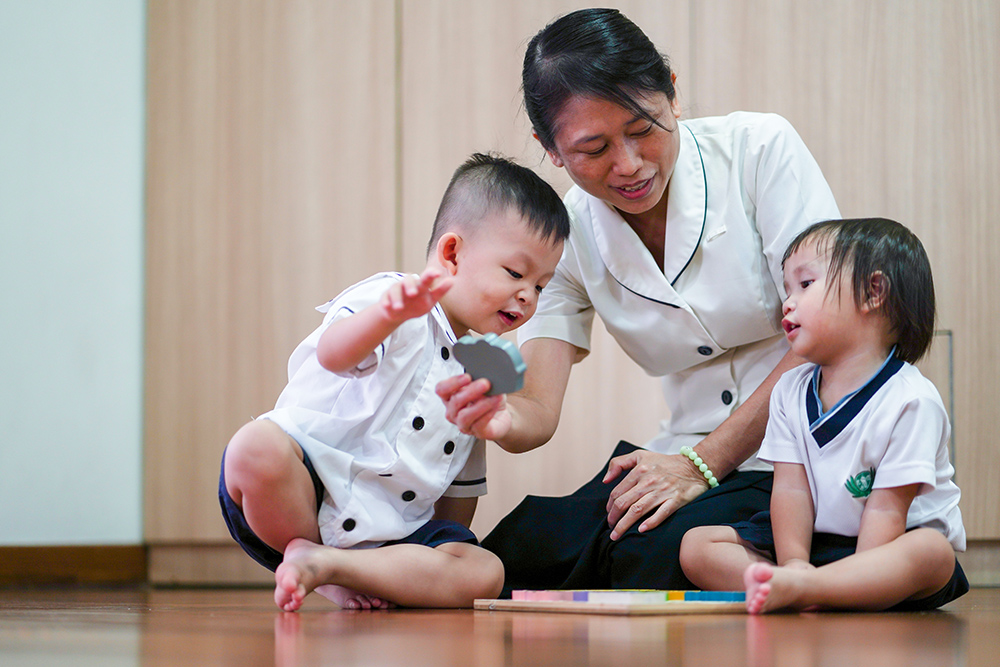 (Photo by Chan May Ching)
(Photo by Chan May Ching)
“Do not underestimate yourself, for human beings have unlimited potential,” quoted May Tai, who believes that this Jing Si Aphorism is particularly suited for young children. She regards it as her motto because the path of learning is never-ending.
She believes that the essence of teaching Jing Si Aphorisms goes beyond educating children; it also inspires the teachers. By internalising the wisdom of the Jing Si Aphorisms, teachers become role models, leading by example. Through activities and games, children experience the meaning of the Jing Si Aphorisms, planting seeds of kindness and positivity in their hearts and minds from an early age. As these seeds germinate and grow strong, the children will develop into reliable individuals, capable of supporting their families and contributing to society in the future.

